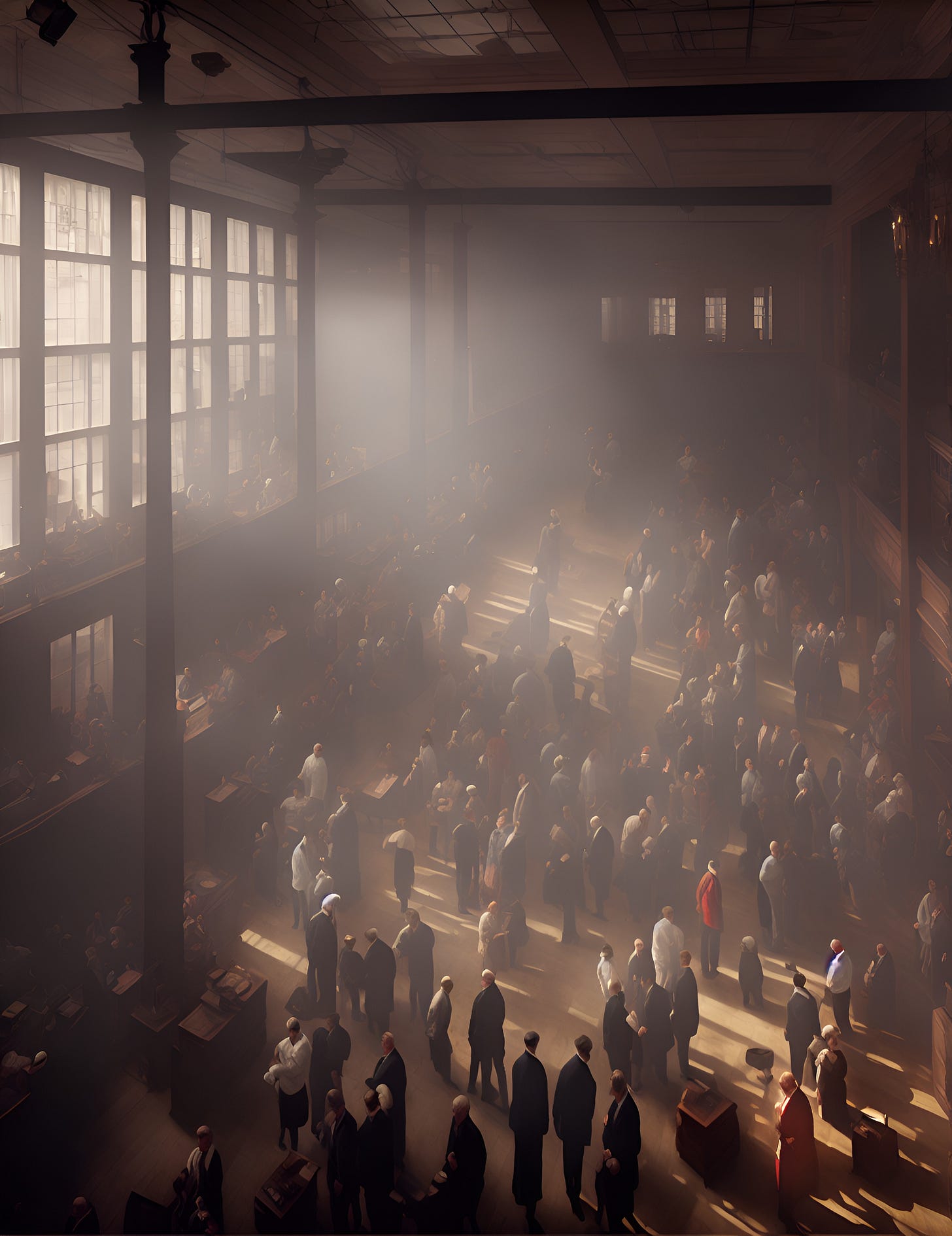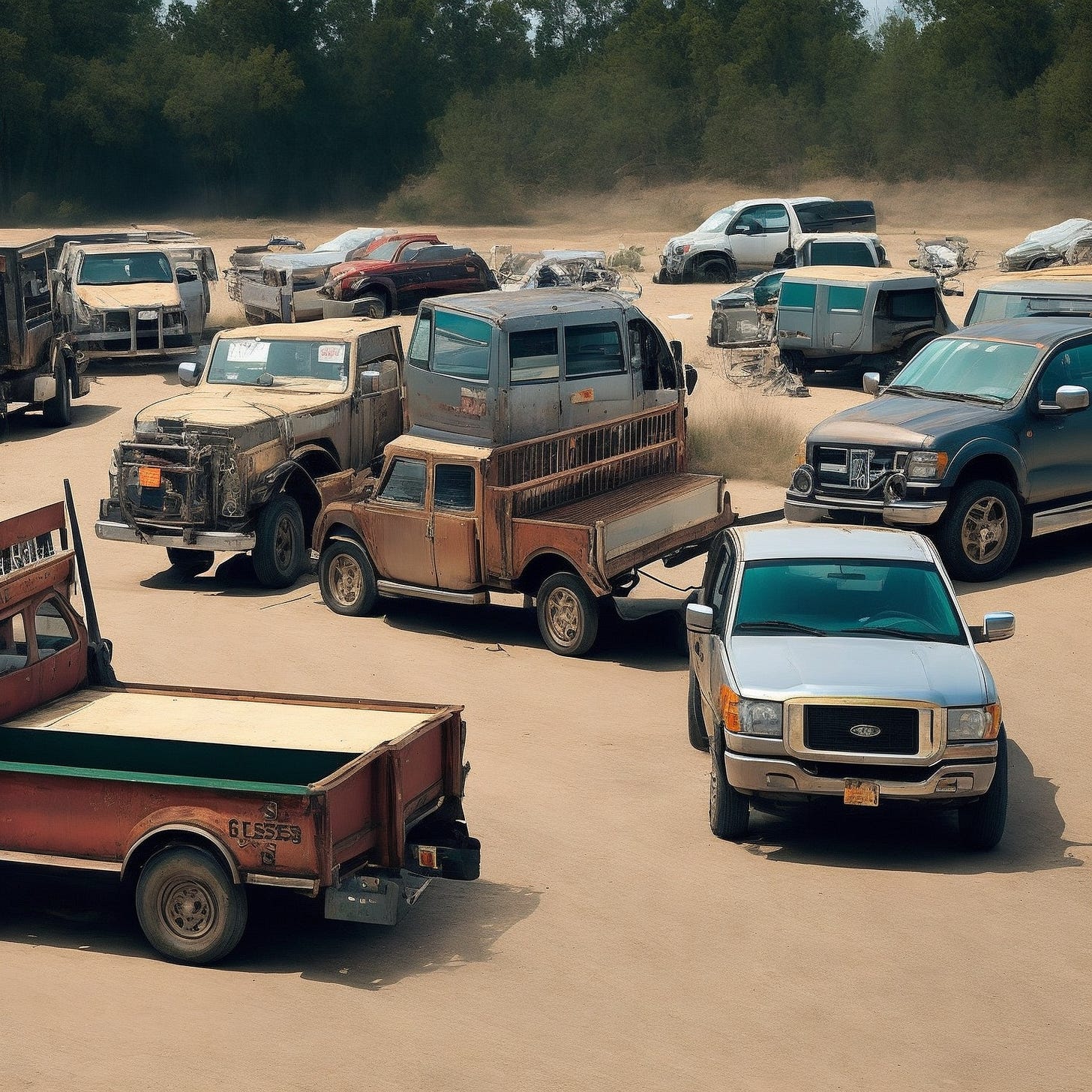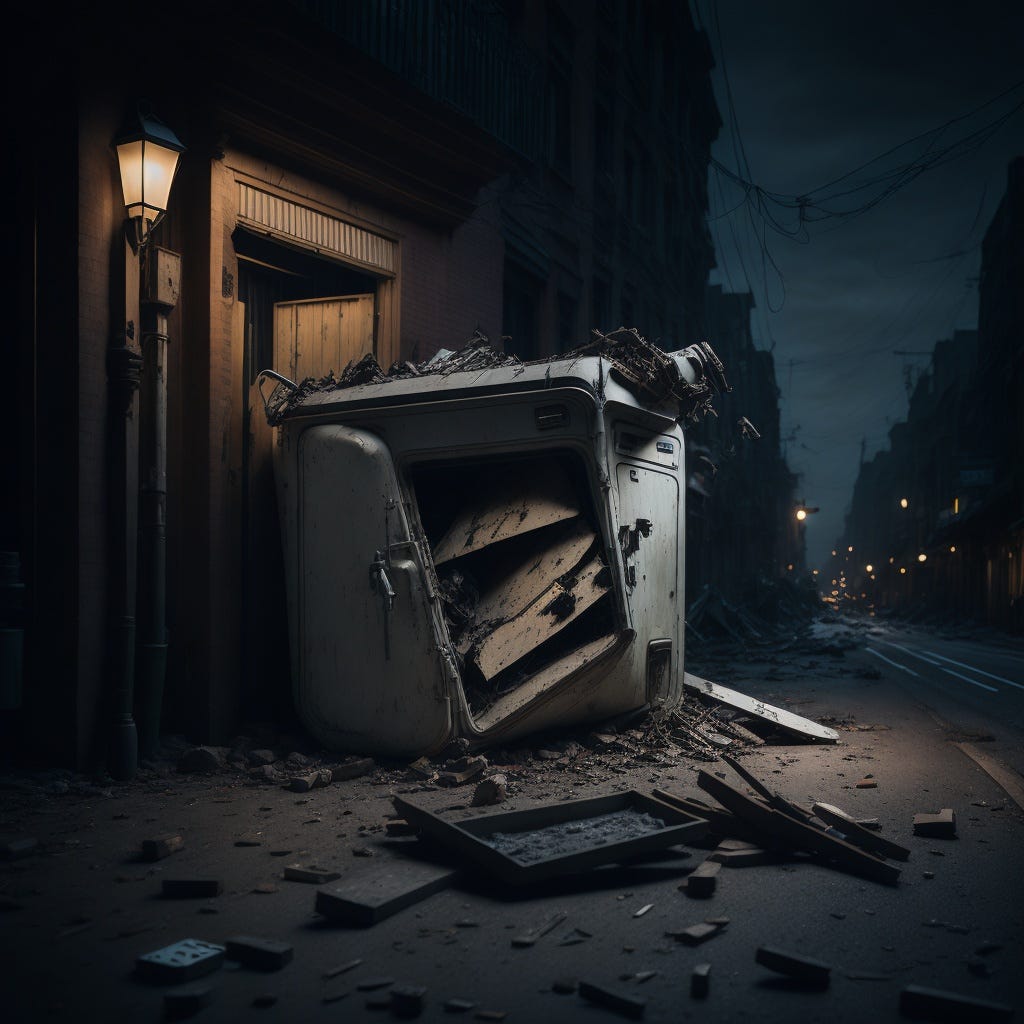One Person's Trash
Welcome to commerce on the fringe - the thrift shop yard sale. Donated items and used things that can’t be sold at a regular retailer go to a thrift store. What can’t be sold at a thrift store comes here. Five mornings per week this parking lot is the auction site for tons of post-consumer jetsam. Dozens of people bid on rolling carts - four foot by four foot open top cubes chock full of clothing, computer parts, stereo components, toys, tools – you name it. Some carts sell for as little as $10, others for more than $100.
There are no guarantees here, no returns. Some of the items may work fine; but many will be tossed in dumpsters immediately as the bins are sorted. All that sorting goes on here in the lot following the auctions, and it makes for a lively, somewhat frenzied scene. The purchased items are piled dangerously high onto trucks and eventually resold in flea markets, antique stores, and yet more yard sales.
This place is both a salvage yard and a treasure chest; and to those who make their living selling merchandise that even thrift stores can’t move, it represents something even more profound - hope.
It’s crowded in here. Crowded, loud, gritty, and poorly lit; but for some reason, I love it. The auction room has the same vibe that causes the visceral turbulence in a concert hall seconds before the main act hits the stage. In addition to the auctioneer’s voice echoing from the PA, a hundred or so bidders yell toward the front of the warehouse attempting to out-shout one another and draw the auctioneer’s attention. There are arguments amongst groups of men, but no fights are breaking out yet. I’m told by one of the bidders that most of the others have unwritten agreements between them as to who can bid for what types of merchandise on any given day.
So on Tuesdays and Thursdays you agree to bid on clothing, tools, and small appliances, and Monday, Wednesday and Fridays, you can only bid on consumer electronics, large appliances, and furniture. The arguments break out when someone fails to stick with their agreement – say, if a bin of furniture is about to be sold for far less than it’s worth, and, despite not being your ‘furniture’ day, the temptation to place a bid is just too great.
In addition, I’m told there’s a hierarchy amongst the bidders that is constantly in flux, depending on their perception of their own seniority on any given morning. If someone sees himself as the senior potential bidder of a particular lot, and it’s at a price that can’t be passed up, all bets are off, all agreements null and void. So there’s more than one way to pick a fight here on the floor, and, according to my source, there are plenty of them.
While an upscale auction house relies on high quality offerings, impeccable standards, and established decorum, this auction relies on quantity over quality, the momentum of mayhem, and a climate of spirit that rides somewhere between promise and anarchy.
Peter pushes a gray, wooden-framed cart down a ramp from the loading dock to the parking lot. He has just left the auction floor where he paid $75 for the contents of the cart. The cart is heavy and he struggles to maneuver it toward his pickup truck. He parks the cart behind his truck and kicks the lock tabs on the wheels. He walks around to the front and swings the hinged door open to reveal stacks of computer monitors, VCRs, and other electronic gear. “Nice.” Peter says, and gestures toward the stash. “Better than Tuesday.” He says.
Peter’s business partner is busy atop the fourteen-foot-high pile of large appliances, furniture and boxes of clothing that are cradled tenuously between the home-made iron scaffolds welded to the frame of the 1974 Dodge D200. He’s stacking the merchandise for travel. Peter explains to me that there’s a technique to arranging all the goods so that they can achieve maximum height and still have a stable load.
Peter holds the bottom of a tape measure as he squints into the sun at his partner who is standing at the top of the pile, holding the other end. “Thirteen-seven,” he shouts and his partner releases his end of the tape. Peter releases the tape measure as the spring-loaded tip comes flying down with a metallic “twang”. “Ten inches under,” Peter says, smiling. “We’ll clear all the overpasses.” “Have you ever measured wrong?” I ask him. “Once,” he says, smiling and shaking his head as he pulls a strap taught, “But no real damage was done. It was early morning, and we were driving to the Santa Fe Springs market and we lost an antique oven. Sparks everywhere. Made a horrible sound when it hit the overpass and the glass door and metal scraped along it, caving in – sounded almost like a human scream. Luckily it was on a side street in San Bernardino, and no one was behind us.” He laughs a little, “Crazy thing is, we made more money from it than we had planned.” I looked at him, surprised. “How’s that?” I ask. “We hadn’t realized that the stovetop grills, which remained intact after the impact, were real collectors’ items. The oven itself wasn’t much of a treasure, but the grills alone were worth over $300.”
Peter turns back to the bin and starts sorting the goods, taking handfuls of computer cables, broken keyboards, and anything else that no longer holds any re-re-sale value to the dumpster in the middle of the lot. I turn back toward the loading dock in time to see two women arguing over a rolling cage of clothing. They’re standing in the middle of the dock, some five feet above the parking lot, yelling and pulling the cage back and forth between them.
The argument intensifies and catches Peter’s attention. He abandons his cart and jogs up the ramp toward the women. I move closer too and witness the larger of the two women take a straight arm swing at Peter who absorbs the hit into his shoulder and back, then struggles to grab the woman’s arms to restrain her. By this time, two other men join the fray, and the scene playing out on the stage becomes part tragic, part comical as everyone grapples to control the two women who have long-since stopped fighting each other, and now just want to be released.
Two of the thrift store employees, standing near the entrance of the lot begin walking toward the melee, but they obviously have no intention of getting involved. They walk several steps, then stop, apparently only to gain a better vantage on the theatrics. But by now, it’s all over. The group at the top of the ramp disperse, and the smaller of the two ladies, the victor, rolls the clothing cart down the ramp toward her husband who had been sitting on the tailgate of their truck watching the show. He has the look of someone who has seen the same play many times, knows the ending, and can't wait to get home. He starts chuckling softly as she approaches and, once she sees that, she laughs a little, too.
The morning warms to noon, and most of the people in the lot are breaking for lunch. Some sit on their truck’s tailgate and open brown bags, but most gather in the center of the lot, dragging chairs of all sorts from their own trucks or borrowed from a neighbor. Men sit and begin talking as women carry bags and large containers of food and arrange them on a bed sheet in the center of the circle. The vicious haggling on the auction floor seems distant, as do the arguments amongst the bidders and the squabbling on the loading dock. What’s left is a very real sense of community.
Peter opens both doors on his pickup and turns his radio up loud enough to fill the lot with music. Three boys play handball against a dumpster. I watch the ball go over the lip, and one of the boys climbs the metal steps to rescue it. Two young girls, perhaps five years old, sit in the shade of a plastic tarp and play with dolls. One of the dolls has an arm missing, but neither girl seems to care in the least.
I realize that I’m watching a picnic. I’m a little disturbed that it took me a few minutes to recognize it. But it all starts coming together. To me, the dumpster is dangerous, the parking lot is dirty, and the imperfect doll is worthless. I become aware of a severe crises of perspective - one that makes me unable to recognize these things for what they really are – a handball court, a picnic area, and a little girl’s new friend.
All the sudden I feel out of place, like I’m crashing a party. Peter breaks off a Coke from the six pack and tosses it to his brother who misses it. It rolls under a cart loaded with computer monitors. They’re laughing as I approach. I shake Peter’s hand, thank him. He holds the grip an extra second, looks at me in the eyes, “Good luck my friend.” he says. I think he’s right. This crowd had a busy, successful morning and all I did was watch - I can only hope the rest of my day is as fulfilling as theirs. I walk the rest of the way across the lot, open the gate, and step through.





